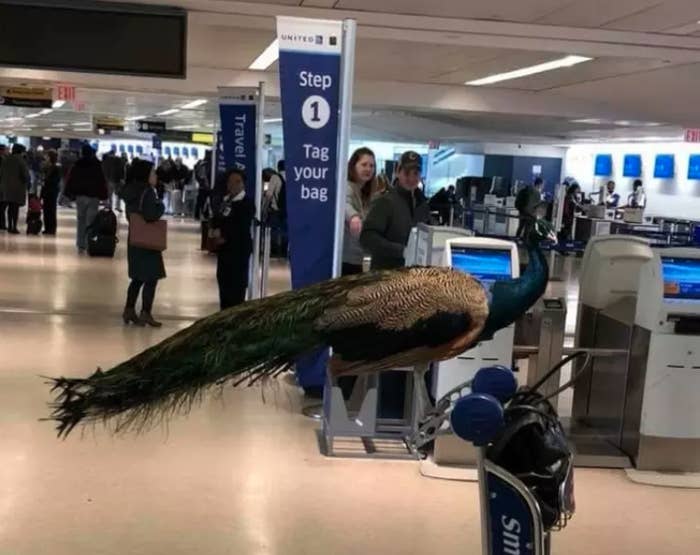
There’s no good way to drown your emotional support hamster, but we now know what a very bad way looks like: under the grim fluorescent lights of an airport bathroom stall, tears streaming down your face as you say a rushed goodbye before cramming yourself into a seat on board America’s worst domestic airline.
It’s an experience you wouldn’t wish on your worst enemy. And yet public sympathy for Belen Aldecosea, the now-notorious 21-year-old hamster killer from Florida, was virtually nonexistent Wednesday as the story of her mercy-flushing was made public by her lawyer, who is currently one of the only people in the United States inclined to say something nice about her.
But it’s important that we not throw out the baby with the toilet water here. Right up until the moment a Spirit Airlines staffer declared her pet was not allowed to fly, Belen Aldecosea had followed all the rules, even calling ahead of time to confirm it would be OK. It was a last-minute intervention by Spirit Airlines — overruling the apparently mistaken guidance given over the phone — that set off a chain of unforced errors that sent Pebbles the hamster to its watery grave. Before Spirit’s sudden reversal, Belen Aldecosea did nothing wrong.
That’s not what you’d hear from people who believe that an emotional support hamster has no place on a plane in the first place. The whole support animal thing has been taken too far, so the thinking goes, with every rando in economy class now convinced they have the right to bring their pet along for the ride just because they bought a certificate on the internet. Even before she dunked her tiny hamster down a toilet, Aldecosea was on the wrong side of the Great Emotional Support Animal Backlash of 2018.
But there’s another way of looking at this whole situation: For once, regular people have found a way to exploit a poorly worded federal regulation to their advantage — something the rich and powerful do constantly, almost as a matter of principle. But when it’s a 21-year-old college student doing the loophole-exploiting instead of a billionaire uninterested in paying taxes, it’s some kind of moral crisis.
The backlash against people bringing dubiously legitimate animals onto flights has been brewing for a while, but it popped off in full force at the end of January after an emotional support peacock was denied boarding by United. The incident was symbolic of the emotional support animal scam, a New York Times column complained — a con that highlights the breakdown of trust and honor in our society. Pet owners are selfishly abusing a loophole designed for those with legitimate medical needs, it concluded, and “people need to make a conscious effort to restore basic decency.”
Business Insider escalated the debate from there. “Emotional support animals help explain how America is losing its mind,” Josh Barro declared, fitting them into a sweeping narrative of a self-centered public that believes it is “entitled to have the world adapt to our preferences, instead of the other way around.” In the Washington Post, George Will bemoaned the animals as evidence that “a cult of personal fragility is becoming an aspect of the quest for the coveted status of victim.”
Alternatively: Maybe people just want to take their cat on a plane, and not pay the hundred-plus dollars that airlines charge for the privilege. Perhaps, after a decade where airlines learned to fee-gouge in every possible way, for everything from checking luggage to changing flights and selecting seats, their customers will do anything in their power to avoid getting screwed with yet another one?
That’s where the alternate explanation for the emotional support animal kicks in: We have learned from long experience that our society is ruled by people who see every law and norm as merely a loophole waiting to be discovered. The wealthy gleefully take advantage of every legal gray area they can find, hiring professionals whose whole job is figuring out how to exploit them, and seeking help from professional services firms that have entire divisions devoted to exploiting loopholes in innovative new ways.
That’s how you end up with multibillion-dollar corporate giants who don’t just pay zero tax — the government somehow owes them money at the end of each year. It’s why your friendly local real estate developer may technically be merely the beneficiary of a trust based in the British Virgin Islands, rather than the owner of a bunch of apartment towers. And it’s why every business in the United States is somehow registered in Delaware, even though Delaware is about the size of a large Amazon warehouse.
Regular people see this going on all around them and think, rightly, that if there’s a badly written aviation regulation whose end result is that they can bring their puppy on a plane, then why not take advantage of it? If your local millionaire is technically domiciled in the Cayman Islands, then what’s so bad about getting an online certificate that lets you fly kitty home for Thanksgiving for free?
None of this means it’s not ridiculous for people to claim their well-being depends on being accompanied in the air by a peacock, or that their Labrador peeing in the aisle of a 737 is simply the price we all have to pay for a society that protects its most vulnerable. But don’t hate the player, hate the game: The people who run this country see scamming the system as their standard operating procedure, and everyone else is just learning to play along, one hamster at a time.
